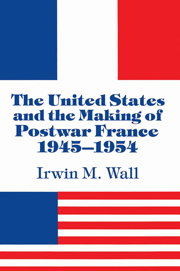Book contents
- Frontmatter
- Contents
- Acknowledgments
- List of abbreviations
- Introduction
- 1 The diplomatic heritage
- 2 The postwar years: Independence compromised
- 3 L'année terrible
- 4 Americanizing the French
- 5 Building an alliance
- 6 The Marshall Plan
- 7 Military aid and French independence
- 8 The United States and French Indochina
- 9 France declares its independence
- Conclusion
- Bibliography
- Index
Introduction
Published online by Cambridge University Press: 04 December 2009
- Frontmatter
- Contents
- Acknowledgments
- List of abbreviations
- Introduction
- 1 The diplomatic heritage
- 2 The postwar years: Independence compromised
- 3 L'année terrible
- 4 Americanizing the French
- 5 Building an alliance
- 6 The Marshall Plan
- 7 Military aid and French independence
- 8 The United States and French Indochina
- 9 France declares its independence
- Conclusion
- Bibliography
- Index
Summary
The United States emerged from the Second World War as the preponderant economic and military power in the world. Western Europe lay weakened and in large part destroyed; the Soviet Union, which suffered enormous devastation itself, shared military hegemony in Europe with the Americans. Under these conditions it was virtually inevitable that the United States would play an enormous role in the process of European reconstruction. American influence in the reshaping of France was correspondingly great. In the absence of serious historical study until recently, the subject has become clouded by political partisanship and mythology. Studies abound with titles that announce their theses: L'empire américaine or La France colonisée. It is axiomatic in some circles that the United States purged the Communists from the French government in 1947, organized the non-Communist labor union Force Ouvriére, forcefully integrated France into a Western bloc of its own making, and imposed upon the unwilling French its own model of organized, consumer-oriented, capitalism. Whatever the degree of truth in such formulations, the reality was more complex. These conclusions were reached without benefit of government documents, most of which have become available in the last decade up to 1954 and beyond. It is now possible to put them to test. French historians have begun to tap sources available in France; until now virtually nothing has been done with benefit of American sources.
Any study of the American role in France must take into account at least four different, distinct, yet interrelated aspects.
- Type
- Chapter
- Information
- Publisher: Cambridge University PressPrint publication year: 1991

